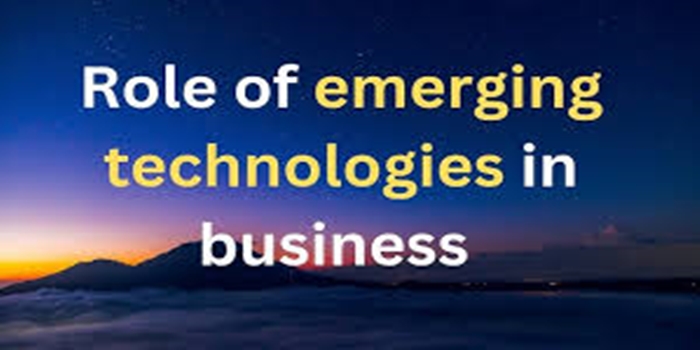In this article, we explained the meaning of emerging technologies on business, the features, the examples, and the benefits.
Definition
Emerging Technologies in Business refer to an advancement that are in the early stages of development but hold important potential to transform how businesses operate, innovate, and compete. These technologies, while not fully established, are gaining drive and have the capacity to interrupt existing business models and create new opportunities.
Features of Emerging Technologies in Business:
Radical Innovation:
Emerging technologies introduce new ways of doing things, often disrupting traditional business models.
Fast Growth:
They rapidly evolve and gain adoption, requiring businesses to adapt quickly.
Prominent Impact:
These technologies have a significant influence on various business functions, including operations, marketing, and customer service.
Uncertainty and Ambiguity:
The future of these technologies is constantly evolving, creating uncertainty and ambiguity that businesses must navigate.
Consistency:
Emerging technologies often work together, creating synergistic effects that can amplify their impact.
Increased Efficiency:
AI and automation can streamline processes, reduce costs, and improve operational efficiency.
Improved Customer Service:
AI-powered chatbots and personalized marketing can enhance customer experiences.
New Business Models:
Emerging technologies can enable businesses to create entirely new products and services.
Enhanced Connectivity:
The Internet of Things (IoT) and 5G networks can connect devices and systems, creating new opportunities for data analysis and decision-making.
Innovation and Competitive Advantage:
Embracing emerging technologies can help businesses stay ahead of the curve and gain a competitive edge.
The Examples of Emerging Technologies on Business:
- Artificial Intelligence (AI):
Automation:
AI algorithms can automate repetitive tasks, freeing up human employees for more strategic work.
Data Analysis:
AI enables businesses to analyze large datasets to identify trends, predict outcomes, and make informed decisions.
Personalized Customer Experiences:
AI can personalize product recommendations, marketing campaigns, and customer service interactions.
- Blockchain Technology:
Enhanced Security: Blockchain’s decentralized and secure nature makes it ideal for transactions and data storage, reducing the risk of fraud and data breaches.
Supply Chain Management: Blockchain can improve supply chain transparency and efficiency by tracking goods and verifying authenticity.
Digital Identity Management: Blockchain can facilitate secure and verifiable digital identities.
- Internet of Things (IoT):
Smart Devices:
IoT enables businesses to connect devices and collect data, creating opportunities for remote monitoring, predictive maintenance, and optimized resource management.
Remote Monitoring:
IoT allows businesses to track assets, equipment, and operations remotely, improving efficiency and responsiveness.
Personalized Experiences:
IoT can enable businesses to gather data about customer preferences and personalize products and services.
- Other Notable Examples:
Robotic Process Automation (RPA):
Automates software-based tasks, improving efficiency and reducing errors.
Quantum Computing:
Offers the potential to solve complex problems that are currently intractable for traditional computers.
Augmented and Virtual Reality (AR/VR):
Creates immersive experiences for customers and employees, enhancing training, product visualization, and customer engagement.
Edge Computing:
Processes data closer to the source, reducing latency and improving responsiveness.
5G Technology:
Enables faster data transfer speeds and lower latency, supporting applications like autonomous vehicles and smart cities.
The Importance of Emerging Technologies for Businesses:
- Enhanced Efficiency and Productivity:
Automation:
Technologies like AI, robotics, and automation can streamline processes, automate repetitive tasks, and reduce manual labor, leading to increased efficiency and productivity.
Data Management:
Emerging technologies like big data analytics and cloud computing enable businesses to collect, store, and analyze large amounts of data, providing valuable insights for decision-making.
Improved Communication:
Technologies like mobile apps, social media platforms, and video conferencing tools facilitate better communication and collaboration both internally and externally.
- Cost Reduction:
Operational Efficiency:
By automating tasks and optimizing workflows, businesses can reduce operational costs.
Resource Optimization:
Emerging technologies can help businesses optimize resource allocation, such as reducing energy consumption or streamlining supply chains.
- Innovation and New Products/Services:
Data-Driven Innovation:
Data analytics and AI can help businesses identify new market opportunities and develop innovative products and services.
New Business Models:
Emerging technologies can enable the development of new business models and revenue streams.
- Competitive Advantage:
Faster Decision-Making:
Real-time data analysis and AI-powered insights enable businesses to make faster and more informed decisions, giving them a competitive advantage.
Personalized Customer Experiences:
Technologies like AI and personalized marketing can help businesses offer more personalized and engaging customer experiences, leading to increased customer satisfaction and loyalty.
Global Reach:
Emerging technologies like cloud computing and e-commerce platforms enable businesses to expand their reach to global markets.
- Adaptability and Flexibility:
Resilience:
Emerging technologies can help businesses become more resilient to disruptions and changes in the market.
Agility:
Businesses can use technology to become more agile and adaptable to changing customer needs and market trends.
Conclusion
Emerging technologies are crucial for business because they drive innovation, improve efficiency, and provide a competitive edge. By embracing these technologies, businesses can optimize processes, reduce costs, and offer enhanced customer experiences. , emerging technologies enable businesses to adapt to changing market conditions and stay relevant in the long term.


